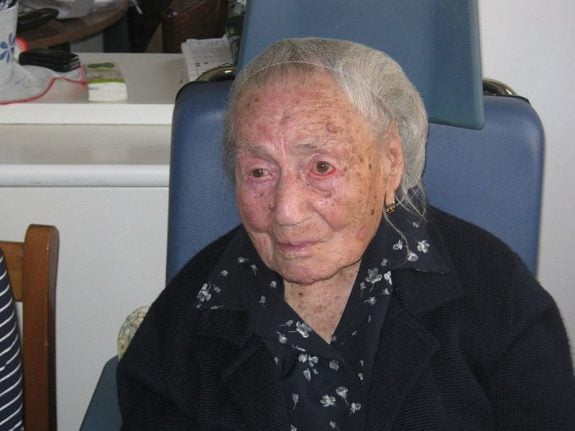Projetto, born to Sicilian parents in Sardinia in 1902, is already the oldest living European after the death of a 116-year-old Spaniard five months ago.
After Japanese “supercentarian” Nabi Tajima passed away on Saturday at the age of 117, Projetto – who turns 116 on May 30th – now finds herself in global second place. The top spot goes to another Japanese woman, Chiyo Miyako, who is older than Projetto by barely a month.
Another Italian, Maria Giuseppa Robucci, is in fourth place on the official ranking compiled by the international Gerontology Research Group. Nonna Peppa, as she's affectionately known, was born in March 1903 in Apulia, where she still resides today.
READ ALSO:
- Growing old in Italy: Italians live longer but suffer more
- This Italian celebrated his 96th birthday by jumping out of a plane
- Italian pensioner fined for crossing the street too slowly
Nonna Pina – that's Projetto's nickname – left her hometown more than 60 years ago for Montelupo Fiorentino in Tuscany, where she lives with her descendants in the family home.
“Big hugs to Nonna Pina from all of Montelupo,” local mayor Paolo Masetti wrote on Facebook congratulating her on her new record.
Dubbed “the grandmother of Italy”, Projetto has been the world's oldest Italian since 117-year-old Emma Morano died last April, followed by 115-year-old Canadian-Italian nun Marie-Josephine Clarice Gaudette, who passed away in July.
She is one of tens of thousands of Italians over 100 and still going. Many scientists have sought to identify the key to Italy's extraordinary longevity, with suggestions ranging from a Mediterranean diet to hormones to sex.
Projetto's family, meanwhile, put her long life down to well-established habits – such as eating chocolate daily – and a certain spirit.
“She has remained fixed in time,” one of her daughters-in-law told a local paper last year. “With resolution, optimism, dignity – and a great love for life.”
READ ALSO: Cheese, wine and family: the Italian way to live beyond 100
Photo: Sergio Pani/Flickr



 Please whitelist us to continue reading.
Please whitelist us to continue reading.